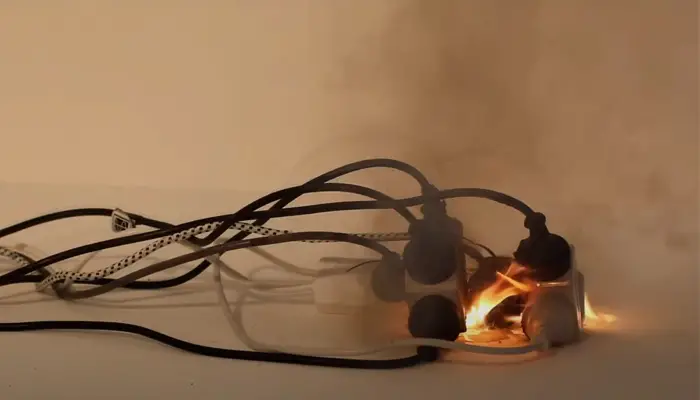To prevent electrical fires in the workplace, ensure regular maintenance of electrical systems, avoid overloading circuits, use high-quality electrical equipment, and train employees on electrical safety.
Promptly address any electrical issues and enforce a strict “no-tampering” policy to reduce the risk of fires.
By implementing these proactive steps, businesses can create a safer working environment, protect their assets, and ensure the well-being of their workforce.
What Causes Electrical Fires In The Workplace?

Electrical fires in the workplace can be triggered by various factors, ranging from faulty equipment to human errors. Here are some common factors that contribute to electrical fires:
Electrical System Overload
Overloading the electrical system is one of the leading causes of electrical fires. When too many appliances or gadgets are connected to a single circuit, the capacity of the circuit is exceeded, resulting in overheating.
Overloaded circuits generate excessive heat, which can ignite nearby combustible materials or cause wires to melt, sparking a fire.
Faulty Wiring and Connections
Worn-out or damaged electrical wiring poses a significant risk in the workplace. Over time, wires can deteriorate due to aging, improper installation, or exposure to environmental factors. Faulty connections, such as loose or improper wire terminations, can also generate heat and spark a fire.
Electrical Equipment Malfunctions
Defective electrical equipment, such as frayed cords, damaged plugs, or malfunctioning switches, can trigger electrical fires. When these components fail to function properly, they may generate sparks or short circuits that ignite nearby flammable materials.
Electrical Equipment Malfunction
Defective or poorly maintained electrical equipment can become a fire hazard. Issues such as faulty switches, outlets, power cords, and machinery may generate excessive heat or sparks, potentially starting a fire.
Lack of Maintenance
Neglecting regular maintenance and inspection of electrical systems and equipment can lead to hidden issues. Accumulated dust, dirt, and debris can increase the risk of overheating and create fire hazards.
What Are Some Ways to Prevent Electrical Fires in the Workplace Without Using an Extinguisher?
To put out electrical fires without using an extinguisher in the workplace, there are a few preventive measures to consider. Regular maintenance and inspection of electrical equipment can help identify any potential hazards or faults. Ensuring proper training for employees regarding electrical safety protocols is crucial. Additionally, implementing fire prevention systems like smoke alarms and fire blankets can help minimize the risk and address the initial stages of a put out electrical fire without extinguisher if it occurs.
Tips to Prevent Electrical Fires

Electrical fires can be devastating and pose significant risks to life and property. Here are some essential tips to help prevent electrical fires in homes and workplaces:
Electrical System Inspection
Regular inspection of the electrical system is crucial to identify potential hazards. A skilled electrician should test the wiring, outlets, switches, and circuit breakers on a regular basis to ensure they are in excellent working order and satisfy safety regulations.
Avoid Overloading Circuits
Plugging too many gadgets into a single outlet or power strip can cause overheating and electrical fires. Spread out electrical loads and use multiple outlets for high-power devices. Consider installing circuits with higher capacity for areas that require many electrical appliances.
Use Surge Protectors
Surge protectors help safeguard electronic devices from power surges and voltage spikes, which can cause fires. Invest in quality surge protectors and use them for sensitive electronics like computers, televisions, and other valuable equipment.
Replace Damaged Cords and Outlets
Frayed or damaged electrical cords, as well as cracked or broken outlets, can be fire hazards. Replace damaged cords and repair or replace faulty outlets promptly to prevent potential fire incidents.
Be Mindful of Extension Cords
Extension cords are meant for temporary use, not as a permanent solution. Avoid using extension cords for high-power appliances or as a substitute for proper wiring. If you require additional outlets, have a qualified electrician install them.
Space Heaters Safety
Space heaters can be a common cause of electrical fires. Keep space heaters away from flammable materials, such as curtains or furniture, and make sure they have a safety feature to shut off automatically if tipped over.
Unplug Appliances when not in use
Unplug appliances while not in use to avoid potential electrical problems. This practice not only reduces the risk of electrical fires but also saves energy and reduces electricity bills.
Avoid DIY Electrical Work
Electrical work should be left to trained and licensed professionals. Attempting DIY electrical repairs or installations can lead to serious safety risks and increase the likelihood of electrical fires.
Install Smoke Detectors
Smoke detectors are critical for detecting fires early. Install smoke detectors in various locations throughout the building and regularly test and maintain them to ensure they are functioning correctly.
Educate and Train Employees
In workplaces, proper training and education on electrical safety are critical. Employees should be familiar with the potential hazards of electrical equipment, know how to use it correctly, and be aware of emergency procedures in case of a fire.
Conclusion
Preventing electrical fires in places of employment is critical for employee safety and property protection.
Regular inspections, adequate maintenance, and adherence to safety requirements can minimize the danger of electrical fires dramatically. Vigilance and awareness are crucial to maintaining a fire-safe workplace.
